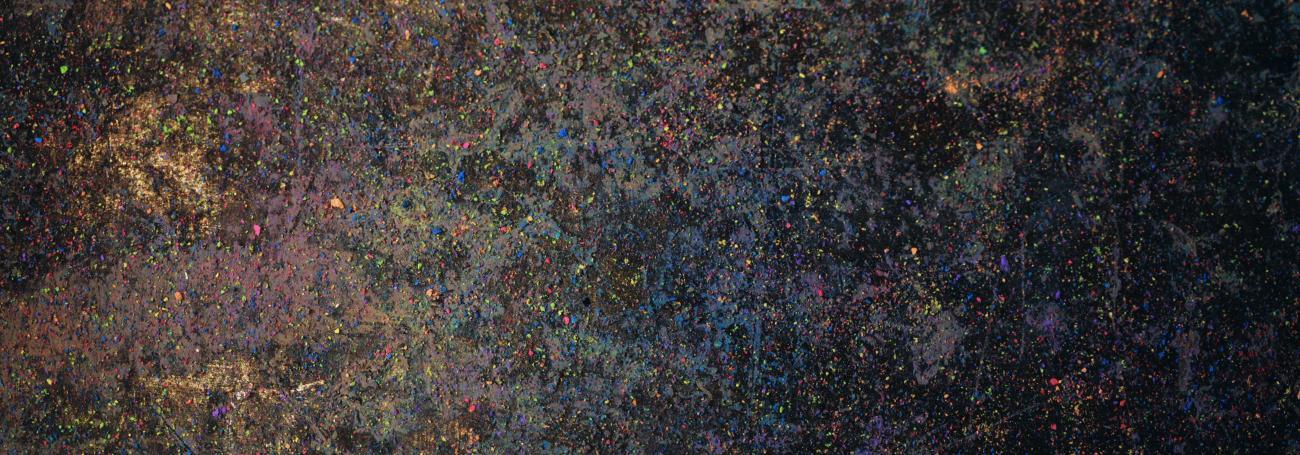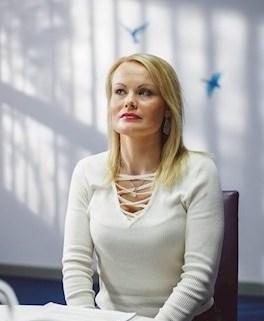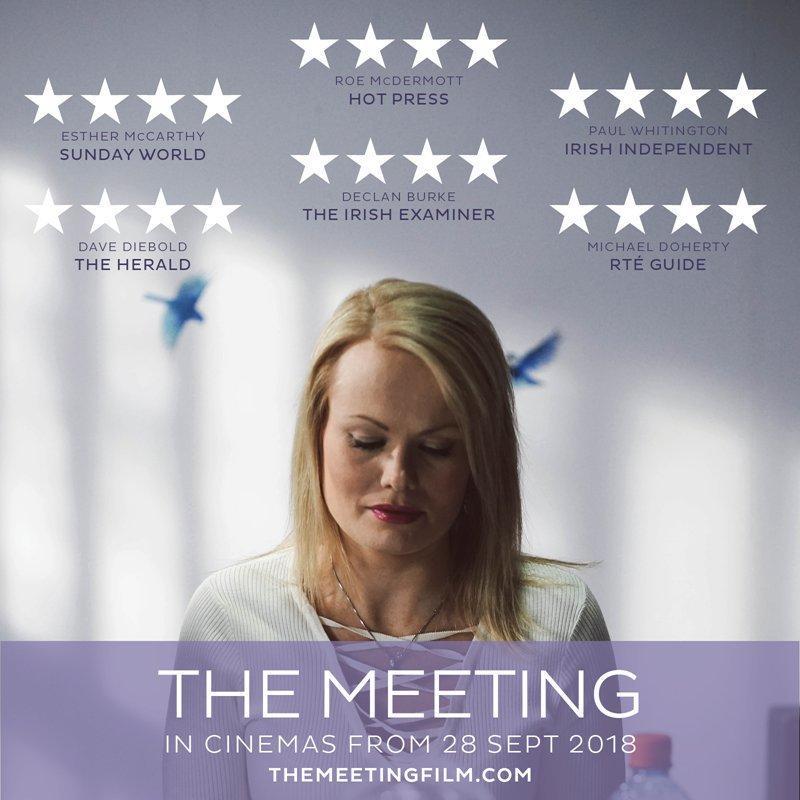

Interview with Ailbhe Griffith
On a restorative approach to sexual violence and the #MeToo movement - Interview for the International Woman’s Day 2020
Ailbhe Griffith advocates for restorative justice as an option for the survivors of sexual violence. She is a survivor of a sexual assault herself, and after being traumatised for years, she learnt about restorative justice as a possible approach to address her harm and decided to take part in a restorative process and confront her attacker, what she recalls as an “utterly transformative” experience. Her journey did not end there. She started to collaborate with Dr Marie Keenan, who is an international expert of the field, in discussing restorative justice and sexual violence publicly.
In 2018, acted herself in Alan Gilsenan’s film, The Meeting, which re-tells her story by focusing on the restorative encounter.
Ailbhe Griffith along with Marie Keenan will be keynote speakers on our upcoming conference in Sassari. The Meeting will be also screened during the conference. On this International Women’s Day we have conducted interviews with both of them. From Ailbhe we asked her about her perspective on restorative justice for survivors of sexual violence and about the MeeToo movement.

You heard about restorative justice accidentally, several years after you were attacked and sexually assaulted. Can you recall how you learned about this option? And what made you think, this could be something for you?
Restorative Justice was something I wanted before I even had the language or terminology to describe it. To summarise, I had spent several years occasionally talking about my desire to confront the man who offended against me face-to-face. One particular day, one of my sisters said to me that what I was describing was a thing called ‘Restorative Justice’. I was shocked and surprised to hear it was a thing, that it had a name and that it was a process. She had heard about it because she was a student of Marie Keenan’s and suggested I contact Marie to discuss what I was feeling. Marie and I met soon after. There began my restorative journey. Ultimately, I felt it was something I needed to attain closure from negative impacts of being a victim of crime. I felt I would achieve this because this need had grown organically over the years within my mind. I had tried all other methods I could think of to overcome the traumatic impact, but it was only within a face-to-face meeting I felt I could regain my power.
The application of restorative justice is often criticised in cases of sexual harm. One reason why it is disfavoured is that is seen as giving an easy way for the offender to escape his deserved punishment. You met your offender after he spent years in prison. Was it easier for you to meet him after years have passed and knowing he already served his sentence?
I would only advocate for restorative justice after sexual violence as an additional mechanism of justice, not as an alternative to criminal justice. There are many reasons why I believe that this is important but one obvious reason is the protection of the public. If there is not a strong reason to dissuade individuals who sexually offend to repeat their offences, then I think risk increases. Having said that I personally am not convinced that a prison sentence has the power to rehabilitate, and that’s where, from an offender perspective, I feel restorative justice may hold power. From a victim’s perspective and in my particular case, I think I could have met him earlier than I did, had I been aware of restorative justice at that time. I believe these meetings can take place in prisons too, so I would have still been satisfied having the meeting when he was actively serving his sentence. Meeting him when he was out of prison was useful because I believe he had started to blend back into a normal enough life, so perhaps he was in a better place to engage in the meeting? One point I would like to add on this more generally is that it may be seen by some as ‘giving an easy way out for the offender’ but in many instances of sexual assault a criminal conviction is not achieved, due to the fact that there is no reporting of the crime, or else as a result of insufficient evidence. As Marie has said in the past, it may be the only form of justice available for these victims, and I agree.
Another reason why restorative justice is opposed in such cases that it could lead to re-victimisation. What would you respond to this? What measures have been taken to avoid re-victimisation in your case?
I acknowledge that is a big fear within the general population, but I would suggest that, with proper preparation of both victim and offender, the risk is greatly diminished. As Marie has often stressed, there is great importance in having facilitators who trained in the impact and dynamics of sexual violence conduct these meetings too. The emotional charge and intensity of meetings in sexual violence cases, I believe, means that extra care should be taken in preparing the parties for as many foreseeable outcomes as possible. Ultimately, in my case there were a few general measures and other practical measures employed to avoid me being re-victimised again. Restorative Justice Services in Dublin did an excellent job in preparing me for the meeting by conducting many preparation meetings over the course of several months. During these meetings I would gain insight into what I may/may not expect from the offender should he choose to continue on into the face-to-face meeting. I found these meetings critical and very useful to avoid any sense of re-victimisation as I went into the meeting with my ‘eyes wide open’. I was emotionally and psychologically prepared for it and most importantly I had a choice at all times on whether or not to proceed. Additionally, from a more practical perspective, the offender and I arrived at the building at different times. I did not see him arrive and vice versa. Similarly, he left after me. Finally, I was very much part of the decision-making process when we were discussing how the room would be laid out on the day. I chose to have a table between us because I did still want a physical barrier, but I did want to sit directly opposite him so I could look at him directly in the eye. All of these types of subtle decisions are important and help reduce risk and minimise the potential for re-victimisation.
"It firmly ended my ‘victim’ identity that I believe I had created in my own mind and I think that is something I feel that can be common in survivors."
Based on your restorative justice experience, would you offer such a programme to other victims of sexual harm? Why? And what would be your arguments to encourage them to consider a restorative justice program?
With absolute conviction I would recommend restorative justice to other victims of sexual crime. It must be something they want of course and it is not something that every victim will want and that must be acknowledged. However, I know that it is an incredibly powerful tool to help crime victims to overcome their trauma and experience healing and closure. For me it firmly ended my ‘victim’ identity that I believe I had created in my own mind and I think that is something I feel that can be common in survivors. This was because I found it totally empowering and changed how I perceived the man who had sexually and physically assaulted me. He was no longer the monster, but instead the human behind the behaviour. It was this that made me realise that it was and never will be my identity but an experience. By speaking openly about my experience of restorative justice and how it can be a way of finding healing and peace, I have always hoped to encourage victims who already feel that they may want to meet their offender to move forward with the process (as long as it’s done in the right way).
You often tell about your participation in restorative justice together with Prof. Marie Keenan. How do you experience this collaboration?
As far as advocating for restorative justice in sexual violence cases, Marie and I seem to come as a pair and have done so right from the time we met in 2013. Our collaboration and friendship has grown organically over time. Advocating collaboratively for restorative justice was not something we necessarily planned, but I think based upon my experience I simply couldn’t resist the idea of communicating its benefit and its power to other crime victims. I believe for Marie, although I don’t want to speak on her behalf, she has also seen first-hand how helpful it can be for victims who want it. I just feel fortunate to have met her.
Do you have any suggestions for practitioners (e.g. mediators, facilitators) to improve the way restorative justice is offered and delivered in cases of sexual harm?
My main suggestion for anyone facilitating cases of restorative justice in cases of sexual violence, beyond the excellent preparation and extra training that I discussed earlier, is to pay extra attention to ensuring the victim feels empowered in the process at all times. Sexually violent crime is highly intrusive and deeply disempowering. Within these meetings the victim will most likely be looking to rebalance that sense of disempowerment. I would suggest avoiding making any decisions on behalf of a victim or deciding what’s best for them. For example, anticipating what they can or cannot handle and therefore whether the meeting should go ahead or not is not ideal. In these cases, more than most, I feel it is critical to let the victim decide as it is that that will help rebalance the power in their own minds.

You played yourself in a film re-enactment of your story, The Meeting. What were your motivations to undertake this role?
As I mentioned I am a passionate advocate for restorative justice. My motivation in sharing my story from the beginning was to highlight that there is a need to make this available for victims because I know from my own experience that some victims will want and need it. I had travelled with Marie, domestically and internationally attending different conferences and communicating this belief. However, when the opportunity to create a film based upon my experience came up, it struck me as an excellent way to really illustrate what it is all about. Talking about your experience is helpful, but actually showing people what took place really brings the point home in a powerful way. This is particularly true because the film had a really talented director; Alan Gilsenan. Naturally I never anticipated a film would be made about it, nor did I expect to participate in the actual film beyond contributing to the script. However, it did take shape rather organically and I felt it was the right thing to do so that we could show its value. I am thrilled to have brought it to many audiences already and I hope that we have helped, to some degree, to raise the profile of victim-initiated restorative justice in Ireland already.
Did the artistic creation have an impact on your relationship to your own story? If yes, how?
I think the main impact it had on my relationship to my own story is that I began to see it from a more objective viewpoint. It was incredibly interesting from that perspective because I suppose when you are living an experience in real time nothing that happens seems particularly dramatic at the time, albeit you may experience its intensity and profundity. It’s when you look back, and in my case at the film, and see it more objectively you realise what an incredible thing it really was. It just makes me more appreciative of having experienced the gift of restorative justice.
Did you share your story with a #MeToo hashtag? Or asking another way, do you think your story aligns with issue the MeToo movement aimed to raise awareness about?
Practically speaking, I never have shared my story with a #Metoo hastag. However, I think I would love to see #restorativejustice in the same tweet as #Metoo much more often! When I think of the MeToo movement, I think it’s wonderful that people now feel much more open to talk about their experiences of sexual assault and of the inadequacies of the CJS for victims of sexual violence, and of the need to empower those who have been disempowered. There was sense of righteous anger in the air and it was an amazing thing to see and it was the right time for it. However, following my restorative justice meeting, I had lost my sense of being disempowered and of being angry about my personal experience. It had evaporated. However, I believe we are at an evolutionary stage now where there is a need for something else to come in and fill the healing void. What I mean by that is that we’re now beginning to acknowledge the levels of sexual violence that permeate our society, so not only do we need to find ways to hold people to account using the criminal justice system, we need to find ways to help heal people who have been harmed by it. It’s going to take a very long time, possibly generations, to make society violence-free zone, so in the meantime, finding mechanisms for healing are critical. I acknowledge there is no single solution for this, but I am absolutely certain that part of the solution is restorative justice. I believe restorative justice is evolving and becoming more mainstream and that soon many people will begin to see it’s full value to help close the void.
What would be your number one priority to advocate for to improve women's situation in society?
In many ways I am fortunate that I do not, in my general life, experience much gender-oriented discrimination or bias and in that way feel a little under-qualified to answer the question. However, I do know there is a huge gap because many women are not in that situation. Rather than considering if from a women’s rights perspective though, I tend to think about it from a gender equality perspective. The ultimate goal should always be that women and men are treated fairly and equally within society and where this falls short we need to rebalance things. My own feeling is that the number one priority to improve women’s situations in society across the globe is access to a full education, because in that there is freedom and independence. If you can think freely and earn enough money to survive, there is enormous freedom in that to help avoid women being trapped in situations where they are disempowered.
Published on 8 March 2020.

